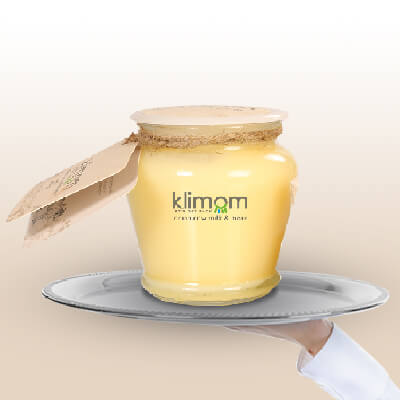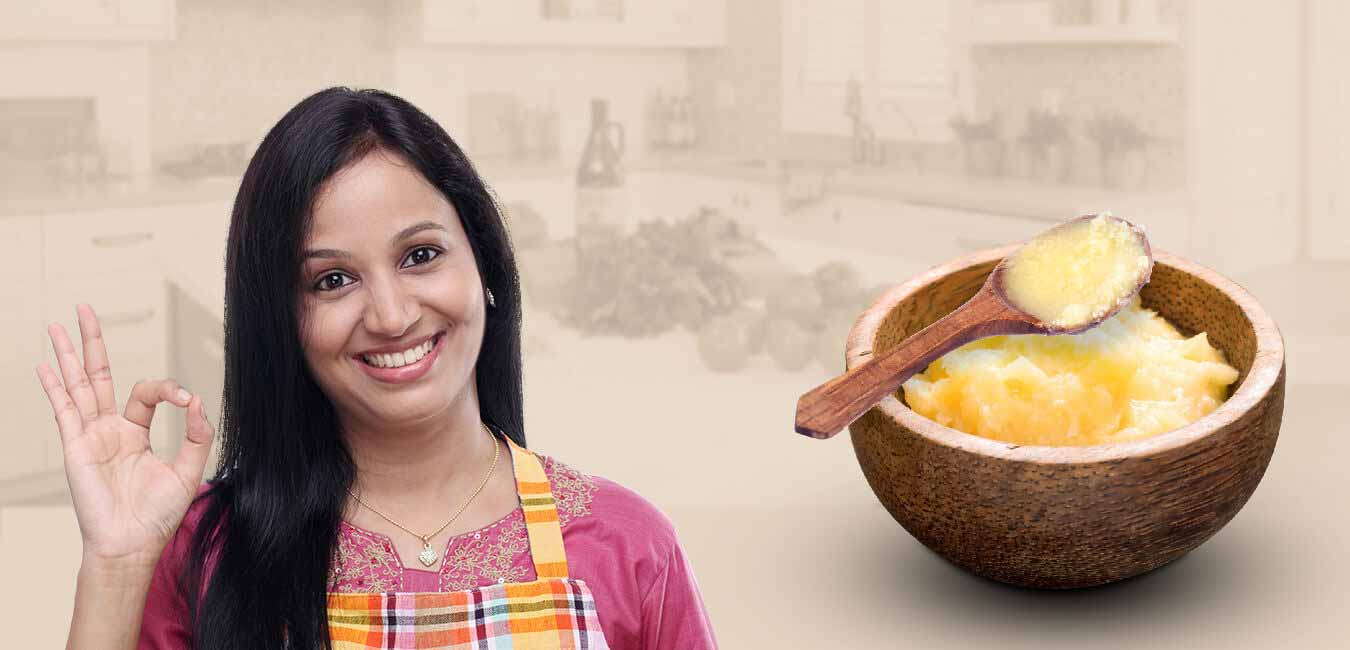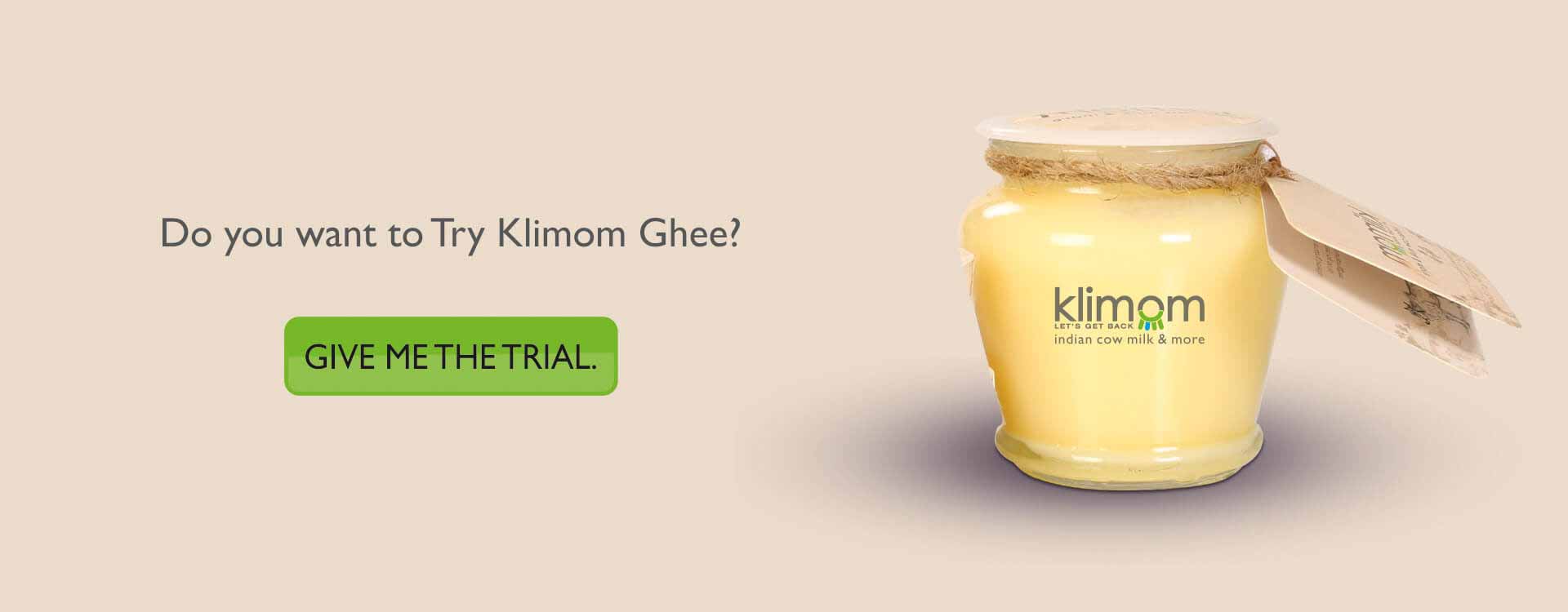Is ghee better than oil for cooking?


The kitchen was filled with the aroma of tempered spices put together in the tadka. No prizes for guessing that some delicious Indian food was on its way to the dining table. Before you ask what was cooking, take a moment to think of “in” what was it being cooked.
Most of us don’t pay much attention to the oil that is used for cooking. Anything works as long as it’s cheap. If its Rs. 75 a liter, then it’s good enough. If the price is not a concern, then images of healthy hearts on the packet will do. But it’s worth really thinking more about this.
Irrespective of whether you use just a small amount of oil for cooking or you choose to deep fry your foods. The type of fat you use really matters. Afterall it is something you consume every single day right?
While there are many types of oils that are available on the market today, there is one which is worthy of a promotion in your kitchen. And that is ghee.
Not to worry if you haven’t already done that. It’s never too late when it comes to making a positive change for good health. There are so many benefits to using this ingredient in your day to day cooking that far outweigh any of the cons.
However the same cannot be said about most of the commonly used cooking oils in Indian homes. This is not to say that all oils are bad. But let’s talk a bit more about ghee and why it is better for cooking.
Ghee has a high smoke point :
Smoke point is the single most important factor to consider when choosing an oil to cook with. Especially when you are cooking food at a high flame, which is the case with all Indian foods.
Ghee is a better medium for cooking as it has a high smoke point. What this means is that it can withstand a higher temperature without breaking down when compared to most commonly used cooking oils.
Oils with a low smoke point tend to degrade easily when subjected to high heat. So instead of getting health benefits from your food, you could be ingesting toxins. Not to mention the rancid taste as well.
You can safely use ghee even for deep frying without any worries.
Medicinal properties of ghee :
Ghee is sometimes like the very welcome free gift on a purchase which comes as a surprise. There’s so much it has to offer but so little we know about it. Since the ancient times, ghee is considered to be very healthy. In fact, it is used extensively in Ayurveda too as a cure for many diseases.
If you consume ghee regularly, it can make your body more flexible by lubricating your joints and connective tissues. It’s said to be a great source for building the body’s immunity and also extends its powers to your brain.
Why would you use any other oil when there is so much goodness in every spoon of ghee? Food for thought!
Good saturated fats in ghee :
Just like all fats are not bad. All saturated fats are also not bad. You are right to be worried about consuming too many saturated fats during the day as they are not great for the heart.
But what is different with the saturated fats in ghee is the unique atom structure when compared to any other saturated fats. This is what gives ghee its medicinal properties and makes it a great addition to your daily diet.
The saturated fats that you consume through ghee contain easily digestible fatty acids (89% short-chain fatty acids). These will not harm you. Instead, they act as antioxidants protecting your body from several health diseases like heart disease and cancer.
On the flip side, some varieties of sunflower oil can increase your risk of heart disease as a result of plaque build up in your arteries. These contain more long-chain fatty acids – in short, the bad saturated fats.
Ghee is easily digested :
Want to avoid that icky feeling of heaviness after having your meal, especially something fried in oil? That’s something that doesn’t exist when you eat food cooked in ghee. Ghee makes even fiber-rich food easy to digest without making you feel heavy and bloated.
Not only that, ghee is even said to aid in the digestion process. When you consume ghee, your stomach secretes acids that speed up the digestion process. The opposite of that happens when you consume regular oils – the digestive process becomes slow and sluggish making you feel lethargic.
Richness of flavour in ghee :
Ghee is like the friend you always want by your side, that makes every occasion special. It has such wonderful health benefits but most importantly so much flavour. Common cooking oils usually don’t add any taste to the food, in some cases that is intentional.
There there are some oils give out a very pungent taste to food (mustard or coconut oil).
Ghee maintains a beautiful balance. The flavour is certainly unmistakable but so pleasant at the same time. Makes my mouth water even thinking of the small dollop of ghee melting over a steaming bowl of rice.
Ghee retains its flavour when stored well :
It’s important to avoid fats that turn rancid because they increase the risk of heart disease and cancer. Buying the right fats and their storage are both very important. Ghee can be stored at room temperature or even refrigerated to elongate its shelf life.
While most oils stay well at room temperature too, with the passage of time, you will observe that they develop a slightly rancid smell. Rancid oils not only smell and taste bad, but they are also not great for your health.
Process of producing oils vs. ghee :
The refining process that store bought oil goes through involves the addition of chemicals and application of really high temperatures. This results in a chemical residue which is unnecessary and unhealthy.
Pure cow ghee, on the other hand, can even be made at home by applying low heat and slowly extracting the fats from the butter. This process doesn’t require the addition of any chemicals whatsoever. It’s completely natural and always a better choice for good health.
PUFA vs. MUFA :
These two acronyms sound like the names of some cartoon characters but they are not to be taken lightly. Poly-Unsaturated Fatty Acids (PUFA) and Mono-Unsaturated Fatty Acids (MUFA) present in the fat decide if it’s good for you or not.
In this story, MUFA is the hero, PUFA is the villian. Ghee and olive oil are rich in MUFA whereas sunflower oil is not. Which is what makes ghee a preferred choice for heart patients as well who need to control their cholesterol levels.
Ghee is healthy not fattening :
I’m sure this is exactly the point you have been waiting to read. Ghee has been given such a bad name for nothing. All fats can be fattening and that is true. Let’s not challenge that.
However, some fats in moderation are actually good for you. Your body needs good fats to think and feel good. Add something like ghee to your diet to not only take care of your fat requirement but also to get a million other benefits.
Ghee promotes good digestion, it boosts your immune system, enhances your memory and the list goes on. Coming to the point that you care about the most, ghee also assists with weight loss. It contains Conjugated Linoleic Acid (CLA) which helps with this master task.
Regular cooking oils have little to offer other than fats and even those may not be too great for your health.
Ghee is better for your heart :
If you have a cholesterol problem, don’t have ghee they say. They are all wrong. Ghee, in fact, has many antioxidants that help protect the heart and many other organs in the body. These fight against the development of fatty deposits in the arteries.
Omega-3 fatty acids and MUFA present in ghee in abundance act as agents for lowering blood cholesterol and maintaining normal blood pressure. Commercial cooking oils have lower quantities of these essential components making them not so suitable.
The choice is in your hands. It’s impossible and not advisable to deprive your body of healthy fats. So you’d rather find something that works best for you. There are ample options that are available on the market today. Always try to pick something that is versatile, natural and tasty!



